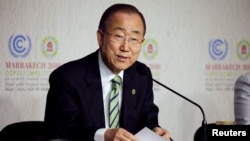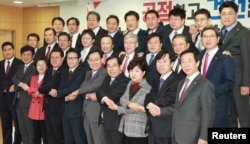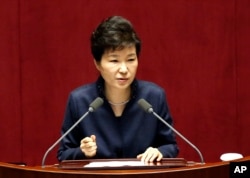A South Korean ruling party faction said on Tuesday it would form a new party, and key members said they hoped outgoing U.N. Secretary-General Ban Ki-moon would join it to launch a widely expected bid to become president.
If Ban joined the new party, it would give him a conservative platform while distancing himself from the ruling Saenuri Party of President Park Geun-hye, which has become tainted by a corruption scandal that led to a parliamentary
impeachment vote against her this month.
The 29 lawmakers defecting from Park's Saenuri Party were among those who supported the parliamentary motion to impeach her over the influence-peddling scandal, which was passed overwhelmingly on December 9.
Some analysts expect the new party to become the country's main conservative force and further defections to it from Park's party were likely, especially if Ban joined.
"We are hoping Secretary-General Ban Ki-moon will join the New Conservative Party for Reform, and if he joins, it will be right that he would compete in a fair primary," Yoo Seong-min, a member of the new party and a possible presidential contender, told TV station SBS, using the new party's tentative name.
In a Realmeter poll released on Monday, 23.3 percent of respondents supported Ban, just ahead of the liberal Democratic Party's Moon Jae-in, at 23.1 percent.
The defections cut the number of seats held by Saenuri to fewer than 100 in the 300-member chamber. The Saenuri unexpectedly lost its majority in April parliamentary elections.
Ban, 72, has not declared an intention to run for president, only saying he would devote himself to the country after his tenure ends this month after 10 years.
Nevertheless, he had until recently been widely expected to run for the top job as a member of Park's party. But running as a Saenuri candidate looks far less attractive given the corruption scandal gripping the country, in which a friend of Park's is accused of colluding with the president to pressure big businesses into paying money to foundations backing Park's initiatives.
Park and the friend, Choi Soon-sil, have denied wrongdoing. Kim Jun-seok, a Dongguk University political science professor, said Ban supporters in the Saenuri Party, including lawmakers from his home region of Chungcheong, were waiting to see what he would do.
A former South Korean foreign minister, Ban has never run for office in his home country.
Joining forces?
Ban could opt to form his own group, with the intention of later joining forces with the new conservative party, saving him from having to run in the new party's primary contest, Kim said, an arrangement which is not unusual in Korean politics.
"Everyone remaining in the party is calculating what their next move should be," Kim said. "Saenuri has lost its identity and the new party will take the lead among conservatives."
The Constitutional Court has up to 180 days to uphold or overturn the impeachment vote against Park, who has been stripped of her powers in the meantime.
If Park's impeachment is upheld, a presidential election will be held in 60 days. An election for the five-year single-term presidency is currently scheduled for December 20, 2017.
The head of the minority People's Party, which holds 38 seats in parliament, has also said it would welcome Ban.
Over the years, South Korean parties have often broken up and reformed in new guises. Ban has been coy about his plans, other than saying he will
return to South Korea on January 15.
"I will devote my whole body to work hard if what I have seen and experienced as the U.N. secretary-general helps develop the Republic of Korea," Ban told Korean media last week at the United Nations.
"I will decide what to do after meeting people from every walk of life after returning home."







